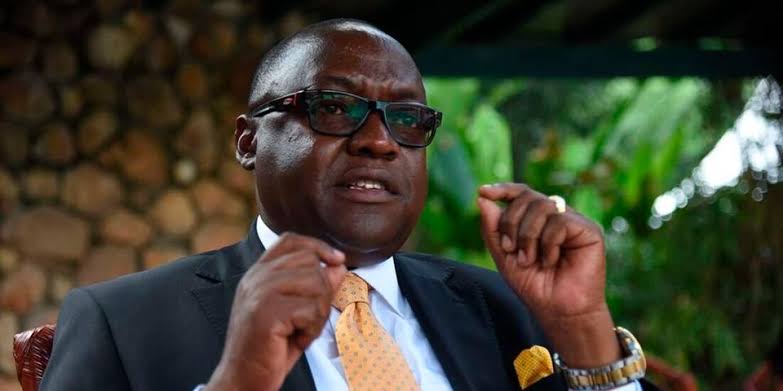Kenya’s politics has always carried drama, but what is unfolding in Nairobi looks more like a calculated script than a natural power struggle. The talk of impeaching Governor Johnson Sakaja has dominated the county assembly in recent weeks, but what lies beneath the noise tells a different story. At the center of it is Deputy Governor Njoroge Muchiri, who now finds himself exposed as the man who stands to gain the most from Sakaja’s downfall.
The whispers in political corridors point to a wider plan backed by former Deputy President Rigathi Gachagua, making this whole impeachment saga less about service delivery and more about Kikuyu political dominance in the capital.
The Numbers and the Backdoor Plan
The numbers in the assembly suggest a strong push to remove Sakaja. Reports show that close to 70 Members of the County Assembly had already appended their signatures to kick off the motion by the end of August.
On paper, they list more than 20 charges ranging from corruption to poor management of funds. While that may look convincing to the public, seasoned watchers of city politics believe this is simply a cover. The real agenda is to push Sakaja out of office, allowing his deputy Njoroge Muchiri to slide into the governor’s chair without ever facing the ballot. It is the classic backdoor entry, a move that denies Nairobi residents their right to choose their leader.
The Kikuyu Affair
What makes this matter even more sensitive is the tribal undertone. Nairobi, being a city of all communities, should never be reduced to a one-tribe power game. Yet, the impeachment push has started to look like a Kikuyu family affair. Both Sakaja and Muchiri trace their roots to the Kikuyu community, and so does Gachagua, who is said to be the invisible hand behind the scheme.
The friction between Sakaja and Gachagua has been evident for some time. It will be remembered that Sakaja supported the move to impeach Gachagua in 2024, accusing him of fueling divisions and meddling in county affairs.
Now, the tables appear to have turned, with Gachagua allegedly driving the effort to unseat Sakaja and replace him with a loyal ally from the same community.
The Danger of Tribal Politics
This ethnic dimension complicates matters further. Nairobi voters come from across the country, and they expect leadership that reflects unity and fairness. But if this impeachment is allowed to pass as planned, it will look like an internal Kikuyu contest being played out at the expense of everyone else.
That kind of politics risks pushing Nairobi back into the dangerous path of tribal polarization, where positions are not earned on merit but handed out as rewards in backroom deals.
For a city already struggling with garbage collection, traffic chaos, and joblessness, such selfish games are a betrayal of the people.
Voices from Within and Outside
Voices from within the assembly have admitted that the impeachment push has not been entirely honest. Kileleshwa MCA Robert Alai has made it clear that while signatures are being collected, the process is being manipulated by leaders chasing personal gain. His warnings show that this fight is less about the governor’s performance and more about who controls City Hall resources.
Even outside the assembly, political commentators have raised the alarm. Some, like blogger Edgar Wabwire, have argued that the whole plan is a calculated move by Gachagua to keep Nairobi under his political influence ahead of the 2027 elections. Such claims fit neatly with the fact that Muchiri would become governor automatically if Sakaja is forced out, a reward that would cement Gachagua’s grip.
Intervention from National Leaders
The involvement of senior national leaders like President William Ruto and Raila Odinga shows just how deep this crisis has cut. Both have reportedly stepped in to convince MCAs to abandon the motion, fearing that the impeachment will destabilize the government’s political balance. Yet even with those interventions, the damage is clear. Trust in Nairobi’s leadership is at its lowest, with residents now wondering whether their leaders are focused on development or on survival and schemes.
Key Taking
The exposure of this plot confirms what many Kenyans have long suspected. Impeachment has become a tool for political blackmail rather than accountability. If Sakaja has indeed failed, the ballot is the right place to pass judgment. Forcing him out just to hand the seat to Muchiri is not only unfair but also dangerous for democracy. It turns leadership into a Kikuyu chess game, where ordinary Nairobians are pawns.
At a time when the city needs working roads, functioning drainage, clean water, and jobs for its youth, the political elite is busy chasing power plays that add nothing to people’s lives.
A Bombshell Revelation
The bombshell here is that Nairobi’s leadership crisis is not about poor governance but about control, ethnicity, and revenge. Gachagua’s fingerprints on the plan raise deeper questions about how far political actors are willing to go to maintain influence. It is a shame that such energy is being spent on betrayal instead of service. Unless Kenyans call this out, City Hall will continue to be treated like a personal inheritance rather than the heart of the nation’s capital.
Nairobi deserves better, and its people deserve leaders who rise through the front door, chosen openly by the voters, not smuggled in through backroom deals.





















Add Comment